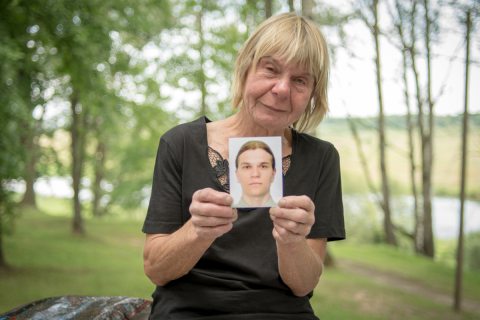House of Representatives: Secrecy of executions suggests anonymity of burial
Tamara Sialiun, the mother of Pavel Sialiun, who was executed in April 2014, has received a reply from the House of Representatives of the National Assembly to her request asking to initiate amendments of Article 175 of the Criminal Executive Code, which prohibits handing over the bodies of executed prisoners for burial or disclosing the place of their burial.
In its response, the Standing Committee on Legislation of the House of Representatives admits that each person after death is guaranteed the right to be buried according to his or her will and wishes of the family, in accordance with the law “On the Burial and Funeral Procedures”. But at the same time it argues that the provision that prohibits handing over the bodies for burial can be treated as a separate administrative and legal enforcement decision. In such circumstances, the refusal to hand over the body serves as a measure of an administrative nature, which has preventive purposes and at the same time is a definite limitation of fundamental rights guaranteed by the Constitution of the Republic of Belarus.
MPs also refer to an annex to Resolution “Safeguards of protection of the rights of persons sentenced to the death penalty”, which states that the procedure of executing the death sentence should be carried out in such a way as to cause the least possible pain. And that concerns not only the convict, but also other people.
That is why, in the opinion of the Standing Committee, Article 175 of the Code provides that “the death penalty is executed in secret and separately for each of the convicts, in the absence of unauthorized persons”. Therefore, having considered Ms. Sialiun’s petition, it concluded that the “non-public nature of the death penalty applies not just to the process of its execution, but also to the process of burial of the body”.
“This prohibition includes the anonymity of the burial,” says the response.
The Committee believes that Article 175 of the Code is in its essence a certain restriction of the rights and freedoms guaranteed by the Constitution, however, may be recognized permissible because it pursues constitutionally protected goals and is necessary to ensure public safety, public order, health or morals, rights and freedoms of others.
It concludes that it does not have grounds to initiate before the Constitutional Court the issue of non-compliance of Article 175 of the Code and the practice of its application with Part 2 of Article 25 of the Constitution of the Republic of Belarus and Article 7 of the International Covenant on Civil and Political Rights, as requested by Tamara Sialiun.
In turn, human rights activist Andrei Paluda, who has been helping the woman within the campaign “Human Rights Defenders Against the Death Penalty in Belarus”, does not agree with these conclusions of the House of Representatives and comments on the received reply:
“Referring to the Constitution and international acts, the Standing Committee on Legislation of the House of Representatives alleged the admissibility of restrictions on the rights of citizens in case of prohibiting to hand over the body for burial. However, it should be noted that, based on the legal practice of the United Nations Human Rights Committee, in particular the cases Bondarenko v. Belarus and Lyashkevich v. Belarus, we can definitely say that these restrictions cannot exist and be recognized as proportionate, acceptable and necessary to achieve the objectives listed in the provisions of the Constitution and international legal instruments. In such cases, it is law enforcement practice that serves as an indicator of understanding the provision”.
In early March, the Lieninski District Court of Hrodna refused to institute civil proceedings against the Department of Corrections of the Ministry of the Interior, who sent Ms. Sialiun the prison uniform of her dead son after his execution. Later, the Constitutional Court said that Tamara Sialiun should write to authorities having the right to initiate amendments to the Criminal Code, instead of writing directly to the Court. As a result, the woman sent petitions to all the bodies that could help amend the Criminal Code: the President of the Republic of Belarus, the House of Representatives of the National Assembly of the Republic of Belarus, the Council of the Republic of the National Assembly, the Supreme Court of the Republic of Belarus and the Council of Ministers.
Pavel Sialiun was sentenced to death and executed on April 18, 2014. About a month later, his mother Tamara Sialiun received his prison uniform. She was not notified of the exact time and place of her son’s burial. Besides, the woman was not allowed to take his body for burial.


